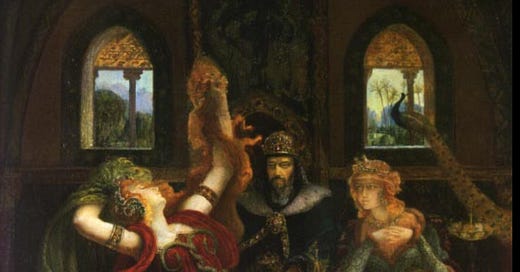Herod Antipas, the tetrarch of Galilee in the first-century AD, lived with his niece, Herodias, the wife of his half-brother in an adulterous relationship that also violated the Jewish laws of consanguinity.
When John the Baptizer called Antipas and Herodias out for their sin (and their crime), Herodias formed a desire to murder John.
You probably know this story well.
Herod, determined both because he thought John was from God and because he feared negative reactions from his people, initially refused to do anything other than confine John to the fortress and prison at Machaerus on the eastern shore of the Dead Sea.
But then, Herod decided to throw a birthday party for himself to which he invited the top civil dignitaries, military commanders, and big shots.
The funny thing is that the ancient Jews didn't normally celebrate their birthdays. The eminent Bible schioar R.C.H. Lenski explains, "The Jews abhorred the keeping of birthdays because they regarded it as a pagan custom, but the Herods even outdid the Romans in these celebrations so that 'Herod's birthday'...came to be a proverbial expression for excessive festival display."
Because of his desperate desire to celebrate himself and his birthday, Herod Antipas found himself manipulated by Herodias and her daughter, Salome, into executing John the Baptizer against his will. You'll remember that Salome's dance pleased Herod Antipas and before all the luminaries whose support he wanted, Antipas pledged up to half his kingdom to Salome if she just told him what she wanted. When, at the apparent prompting of her mother, Salome requested the head of John the Baptizer on a platter, Antipas felt compelled to comply.
Of course, John's martyrdom as faithful preacher of Jesus accorded with God's plan and because John the Baptizer died believing in the God revealed in Jesus, we can be assured that he is safely in God's hands today and forever.
But Antipas, who craved power and the acclamation of the world, anxious that the world would celebrate his birth and acknowledge him as king, is just another of a long list of thugs who, it seems, died far away from God.
He also died far from the power and acclamation he craved. According to the first-century Jewish historian Josephus, Herodias was the cause of Herod Antipas' fall, as the Romans under whom he had lived as a puppet king, stripped Antipas of all his lands and his crown and sent into exile.
Antipas, the scion of a wealthy and powerful family, seemed to think he had the world figured out and that he was a winner. He learned too late he was wrong. Egotism and self-promotion, to which we're all prone, can be fatal to our eternal souls. The words in a Bruce Cockburn song apply well to him, "You can take the wisdom of this world / And give it to the ones who think it all ends here..."
Life doesn't end here. The only question is whether we're to spend our lives beyond here with God, in forgiveness, joy, and peace, or in hell and condemnation.
None of this depends on our performances or decisions, but on the grace and forgiveness of God, freely given to us in the One to Whom John the Baptizer pointed: Jesus of Nazareth, true God and true man, who died and rose for sinners like you, me, John, and Herod.
Those who receive the good news about Jesus have what none of us deserves or can earn, the righteousness of God that makes us fit for life with God now and forever. We are justified--declared innocent despite the evidence to the contrary--by God's charity, His grace, through God-given faith in Jesus. We are covered in Jesus and His perfect righteousness.
Those who spurn the God revealed in Jesus, like Antipas, stand naked in their sins, far from God, condemned.
There is good news!
"God shows his love for us in that while we were still sinners, Christ died for us." (Romans 5:8)
John the Baptizer himself pointed to Jesus and said, "Behold! The Lamb of God." (John 1:36) In other words, Jesus is the Lamb Whose sacrificial offering of His sinless life for us on the cross erases the power of sin and death over us forever.
And Jesus tells us: "Whoever believes in the Son has eternal life; whoever does not obey the Son shall not see life, but the wrath of God remains on him." (John 3:36)
From all that we know of Herod Antipas, the wrath of God--the condemnation for sin--remained on his proud, boastful, selfish life until he died.
But you need not be condemned!
Jesus died and rose for you. Turn away from sin and death and turn to Him in faith for life with God that starts now and will continue in perfection when He calls you from your grave and says, "Come, you who are blessed by my Father, inherit the kingdom prepared for you from the foundation of the world." (Matthew 25:34-35)




